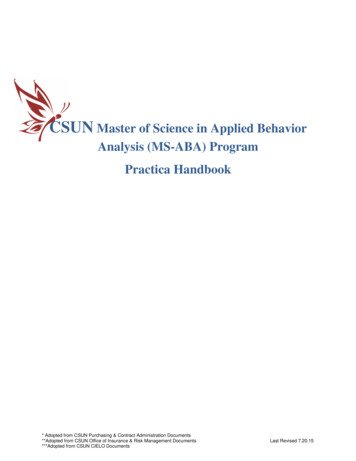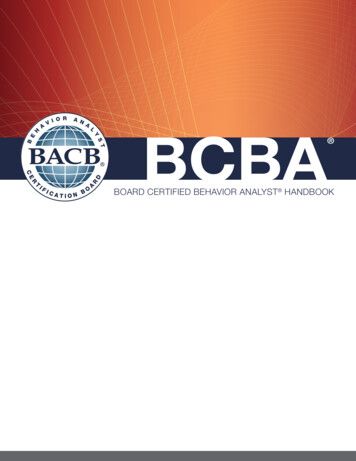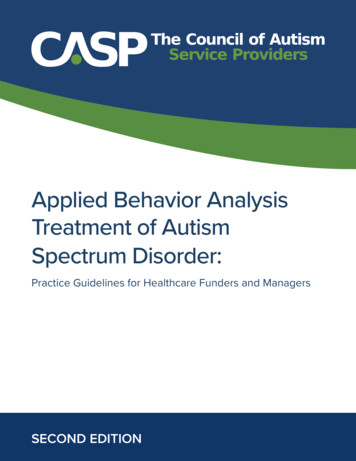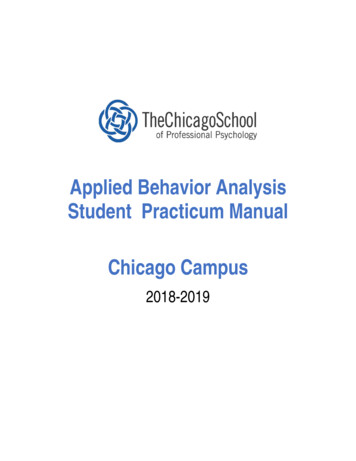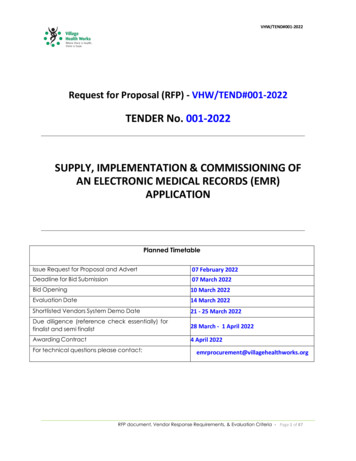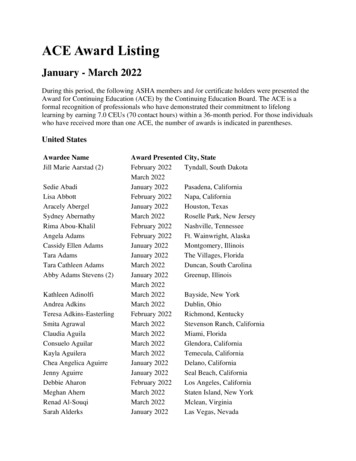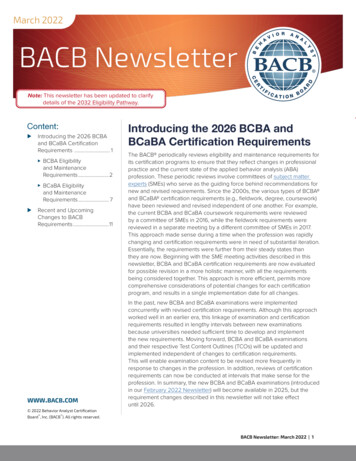
Transcription
March 2022BACB NewsletterNote: This newsletter has been updated to clarifydetails of the 2032 Eligibility Pathway.Content: Introducing the 2026 BCBAand BCaBA CertificationRequirements . 1 BCBA Eligibilityand MaintenanceRequirements. 2 BCaBA Eligibilityand MaintenanceRequirements. 7 Recent and UpcomingChanges to BACBRequirements.11www.bacb.comIntroducing the 2026 BCBA andBCaBA Certification RequirementsThe BACB periodically reviews eligibility and maintenance requirements forits certification programs to ensure that they reflect changes in professionalpractice and the current state of the applied behavior analysis (ABA)profession. These periodic reviews involve committees of subject matterexperts (SMEs) who serve as the guiding force behind recommendations fornew and revised requirements. Since the 2000s, the various types of BCBA and BCaBA certification requirements (e.g., fieldwork, degree, coursework)have been reviewed and revised independent of one another. For example,the current BCBA and BCaBA coursework requirements were reviewedby a committee of SMEs in 2016, while the fieldwork requirements werereviewed in a separate meeting by a different committee of SMEs in 2017.This approach made sense during a time when the profession was rapidlychanging and certification requirements were in need of substantial iteration.Essentially, the requirements were further from their steady states thanthey are now. Beginning with the SME meeting activities described in thisnewsletter, BCBA and BCaBA certification requirements are now evaluatedfor possible revision in a more holistic manner, with all the requirementsbeing considered together. This approach is more efficient, permits morecomprehensive considerations of potential changes for each certificationprogram, and results in a single implementation date for all changes.In the past, new BCBA and BCaBA examinations were implementedconcurrently with revised certification requirements. Although this approachworked well in an earlier era, this linkage of examination and certificationrequirements resulted in lengthy intervals between new examinationsbecause universities needed sufficient time to develop and implementthe new requirements. Moving forward, BCBA and BCaBA examinationsand their respective Test Content Outlines (TCOs) will be updated andimplemented independent of changes to certification requirements.This will enable examination content to be revised more frequently inresponse to changes in the profession. In addition, reviews of certificationrequirements can now be conducted at intervals that make sense for theprofession. In summary, the new BCBA and BCaBA examinations (introducedin our February 2022 Newsletter) will become available in 2025, but therequirement changes described in this newsletter will not take effectuntil 2026. 2022 Behavior Analyst CertificationBoard , Inc. (BACB ). All rights reserved.BACB Newsletter: March 2022 1.
The BACB recognizes that it may seem too soon to consider new BCBA and BCaBA certificationrequirements, given that the last set of changes was implemented on January 1, 2022. However, thesechanges require sufficient notice so that universities, among others, can sufficiently prepare before they gointo effect. The remainder of this newsletter details recent requirement reviews for the BCBA and BCaBAcertification programs and the resulting changes.BCBA Eligibility and Maintenance RequirementsAs stated earlier, the BACB uses SME committees to guide its requirement reviews. In August 2021, acommittee of 9 SMEs participated in a 2-day hybrid meeting to evaluate the current BCBA certificationrequirements. The chosen SMEs represented a variety of professional and training backgrounds, professionalroles (e.g., practitioner, faculty member), geographic locations, genders, races/ethnicities, and career stages. Inaddition, a 10th SME was included as a liaison from the Association for Behavior Analysis International (ABAI)during the evaluation of coursework requirements. All SMEs were certified at the BCBA or BCBA-D level.At the meeting’s outset, the committee was presented with data illustrating the growth of and US demand forBACB certificants, a description of the BACB’s requirement review process, and a summary of key historicalchanges to BCBA requirements. During the meeting, the current BCBA requirements were presented one at atime for committee review and discussion. Data from internal BACB systems, recent surveys, and comparableprofessions were provided to inform the discussion. Ultimately, each requirement was carefully discussed andeither revised or left intact. A consensus approach was used to determine revisions to the requirements.In November 2021, the BACB Board of Directors reviewed and approved the committee’s recommendations,which are described in the following sections. Except where otherwise noted, all changes will go into effecton January 1, 2026.Eligibility Pathways. There are currently 4 BCBA eligibility pathways, each of which requires an academicdegree; behavior-analytic coursework, teaching, or practice-based experience; and supervised fieldwork:Pathway 1 (ABAI-Accredited Degree), Pathway 2 (Behavior-Analytic Coursework), Pathway 3 (Faculty Teachingand Research), and Pathway 4 (Postdoctoral Experience).The committee reviewed all of the eligibility pathways and their requirements and recommended no majorchanges to the most commonly used Pathways: 1 and 2. Both of these require an acceptable graduate degreeand substantial behavior-analytic coursework. In accordance with the Tiered Model of Education recentlyimplemented by ABAI, Pathway 1 will be expanded to include other recognized behavior analysis graduatedegree programs in the new system. This change has also been made to the current BCBA Pathway 1.After reviewing data on the number of approvable applications the BACB annually receives under Pathways 3 and4 (approximately 10 approvable applications between both pathways per year in the last 5 years), the committeediscussed whether the BACB should continue to offer these pathways. These pathways were establisheddecades ago when professionals needed a variety of options to qualify for certification due to a lack of traininginfrastructure. The low volume of applications received under these pathways and the likelihood that fewerapplicants will use these pathways in the future led to the consensus that these pathways will be discontinued.Therefore, beginning in 2026, all new BCBAs must have had a formal, didactic education in behavior analysis.2026 BCBA Eligibility PathwaysPathway 1:ABAI-Accredited or ABAI-RecognizedDegree ProgramDegreeBehavior-analytic contentFieldworkPathway 2:Behavior-Analytic CourseworkMaster’s degree or higher from anABAI-accredited or ABAI-recognizeddegree program (ABAI Tier 1, 2a,or 2b)Master’s degree or higher inany discipline from a qualifyingeducational institutionPractical fieldwork in appliedbehavior analysisPractical fieldwork in appliedbehavior analysisBehavior-analytic courseworkBACB Newsletter: March 2022 2
2032 Eligibility Pathway. The committee discussed the idea of eventually eliminating Pathway 2 (BehaviorAnalytic Coursework), meaning that all BCBA applicants would qualify by earning a master’s degree inbehavior analysis, which is the conventional pathway in most major professions. Because BCBA certificationrequirements are reviewed approximately every 5 years and universities may need time to develop theirprogram(s) to meet ABAI accreditation standards, more notice than is customarily provided is necessary.The committee agreed that now is the time for this announcement so that the profession can effectivelyprepare for and achieve what will perhaps be the terminal educational requirement for BCBA certification: acomprehensive, integrated, program-based education in behavior analysis as defined by ABAI accreditation.We should note that ABAI accreditation is available to university training programs regardless of programname (e.g., a special education could apply for ABAI accreditation).2032 BCBA Eligibility PathwayPathway 1:ABAI-Accredited Degree ProgramDegreeBehavior-analytic contentMaster’s degree or higher from an ABAI-accredited degree program(ABAI Tier 1)FieldworkPractical fieldwork in applied behavior analysisCoursework. The committee reviewed the current BCBA Pathway 2 coursework requirements, alongwith coursework feedback provided directly to BACB personnel and through the BACB website in recentyears. After an in-depth examination of the coursework requirements, the committee agreed that theoverall number of instructional hours (315) remains sufficient and does not need to increase. However, thecommittee recommended that each of the content areas be taught within freestanding courses to givestudents more concentrated doses of the course material. This continues a trend in freestanding courserequirements that began over a decade ago. The committee elected to retain the amount of instruction inthe ethics, research methods, philosophical underpinnings, and concepts and principles content areas butrecommended title changes and the inclusion of content-area descriptions to enhance clarity. The committeefelt that there was a need for greater flexibility in the behavior assessment and intervention content areassince they can be effectively taught in various course configurations. After discussion, the committeerecommended combining the Behavior Assessment, Behavior-Change Procedures, and Selecting andImplementing Interventions content areas into a single Behavior Assessment and Intervention content areawith a 90-hour instructional requirement. The committee also determined that the Personnel Supervisionand Management content area needed expansion given the increasing managerial responsibilities assignedto early-career BCBAs. They recommended an increase from 30 to 45 instructional hours in this contentarea, along with a title change (to Organizational Behavior Management) that conveys a broader array oftopics, including behavioral systems analysis and leadership. Finally, the committee discussed whether DEI(diversity, equity, and inclusion) content should be added to the coursework requirements and, if so, whetherit should be added as its own content area or incorporated into one or more of the other content areas. Thecommittee’s consensus was that DEI content should be integrated throughout the curriculum rather thanconcentrated in a single course.The following table summarizes the 2026 BCBA Pathway 2 coursework requirements and introduces titleand content-area descriptions that have been revised for clarity:BACB Newsletter: March 2022 3
2026 BCBA Pathway 2 Coursework RequirementsContent Areas and DescriptionsInstructional HoursBasic Principles of BehaviorCourse content includes, but is not limited to, the basic concepts andprinciples of operant and respondent conditioning.(within 1 freestanding course)Theory & Philosophy in Behavior AnalysisCourse content includes, but is not limited to, the underlying theoretical andphilosophical foundations of behavior analysis (i.e., behaviorism).(within 1 freestanding course)Research Methods in Behavior AnalysisCourse content includes, but is not limited to, measurement, data displayand interpretation, single-case designs, intervention and program evaluation,and research ethics.Behavior Assessment & Intervention*Course content includes, but is not limited to, the selection andimplementation of behavior assessment and intervention techniques andapproaches from applied behavior analysis.Organizational Behavior Management*Course content includes, but is not limited to, performance analysis andmanagement, supervision, staff training, behavioral systems analysis,organizational culture, and leadership.Ethics in Behavior Analysis*Course content includes, but is not limited to, ethical principles, the BACB’sethics codes and requirements, the BACB’s code-enforcement mechanisms,and professionalism.TOTAL45 hours45 hours45 hours(within 1 freestanding course)90 hours(within 2 freestanding courses)45 hours(within 1 freestanding course)45 hours(within 1 freestanding course)315 hours*Issues related to diversity, equity, and inclusion must be integrated into the course.Coursework Expiration. The committee discussed whether to place an expiration date on courseworksubmitted toward BCBA certification. The BACB currently accepts coursework completed at any time.Although most coursework submissions are from recent years, coursework from as early as the 1980s isoccasionally submitted. Coursework expiration dates are used in comparable professions to ensure thatinstructional content reflects the contemporary era, which is especially important for rapidly changingprofessions like ABA, and because documentation of required coursework (e.g., syllabi) is often more readilyavailable in recent courses. The committee recommended a rolling 10-year limit on coursework submittedtoward BCBA certification beginning in 2024.Supervised Fieldwork. The committee reviewed the current supervised fieldwork requirements, internalBACB data, and the experiential requirements of comparable professions. After extensive discussion, thecommittee agreed that the current fieldwork types (i.e., Supervised Fieldwork, Concentrated SupervisedFieldwork) and total hours (i.e., 2,000 hours, 1,500 hours) are still appropriate and do not need revision.However, the committee recommended that 4 elements of the current supervised fieldwork requirementschange. All other supervised fieldwork requirements (e.g., consulting supervisor requirements for firstyear BCBAs who supervise) will remain the same. The 4 changes that the committee recommended areas follows: The maximum number of fieldwork hours that can be accrued within the calendar month (supervisoryperiod) will be increased from 130 to 160 to better match full-time employment. The number of contacts with supervisor per supervisory period requirement will be eliminated, as it isduplicative of the supervision per supervisory period requirement but is expressed using a frequencymetric (# of contacts) rather than a percentage metric (% of hours supervised).BACB Newsletter: March 2022 4
The observations with client per supervisory period requirement will be expressed using a durationmetric rather than a frequency metric to ensure that a specified amount of client observation occurs:60 cumulative minutes for Supervised Fieldwork and 90 cumulative minutes for ConcentratedSupervised Fieldwork during the supervisory period. This also provides the supervisor with moreflexibility to conduct, for instance, 1 60-minute observation or 4 15-minute observations. The percentage of Supervised Fieldwork hours that must be supervised will remain at 5%, but thepercentage of Concentrated Supervised Fieldwork will be adjusted to 7.5% to match the differencein the overall number of fieldwork hours under each option. In other words, with the new adjustment,Supervised Fieldwork will require one-third more fieldwork hours than Concentrated SupervisedFieldwork and a supervision percentage amount one-third less than Concentrated Supervised Fieldwork.The following table summarizes the 2026 BCBA supervised fieldwork requirements:2026 BCBA Supervised Fieldwork RequirementsRequirementFieldwork hours requiredSupervised FieldworkConcentrated SupervisedFieldwork2,0001,500Supervisory period1 calendar monthFieldwork hours persupervisory periodmin of 20 hours–max of 160 hoursObservations with client persupervisory periodSupervision persupervisory period60 min (cumulative)90 min (cumulative)5% of hours7.5% of hoursIndividual supervision hours persupervisory periodAt least 50% of supervised hours must be individual (i.e., groupsupervision may not exceed 50%).Unrestricted activitiesAt least 60% of total supervised fieldwork hours must be spentengaged in unrestricted activities.Continuing Education. There are 3 types of continuing education available to BCBAs: Learning, Teaching,and Scholarship. After reviewing internal data on which types BCBAs use to meet their continuing educationrequirements and on the amount of continuing education required by comparable professions, thecommittee concluded that the overall number of hours (32) and types of continuing education are acceptableand will not change. The committee agreed to retain 4 CEUs in ethics per cycle but recommended that therequired number of supervision CEUs (for those who supervise) should be increased from 3 to 4 per cycle,especially since data from the BACB’s Ethics Department indicate that supervision-related ethics violationsremain one of the most common violation categories. The committee also discussed whether DEI contentshould be incorporated into the continuing education requirements and, if so, whether it should have itsown category or be incorporated into a broader ethics category. The committee’s consensus was that thereshould be a new DEI category and that 2 CEUs would be an appropriate requirement.BCBAs recertifying on or after January 1, 2026, must meet these requirements (i.e., complete continuingeducation in accordance with these requirements).BACB Newsletter: March 2022 5
2026 BCBA Continuing Education RequirementsCEUs per 2-year cycle: 32 Ethics: 4 Supervision (if applicable): 4 Diversity, Equity, and Inclusion: 2Implementation. With the exception of the new Coursework Expiration Policy (beginning in 2024), all ofthe aforementioned requirements will go into effect on January 1, 2026. This means that BCBA applicantsand recertifying BCBAs applying on or after January 1, 2026, must meet these requirements. Until then,we encourage university instructors, certificants, applicants, and trainees to become familiar with the newcertification and recertification requirements and make any needed adjustments to their practices.2022 revisionsto core BCBAeligibility andmaintenancerequirementsgo into effectCourseworkExpiration Policygoes into effectThe BCBAexaminationis based onthe BCBA TestContent Outline(6th ed.)20322620252024202022Timeline of Upcoming Changes to BCBA Requirements2026 revisionsto core BCBAeligibility andmaintenancerequirementsgo into effectBCBA Pathway1 becomes theonly eligibilitypathway forBCBA certificationBACB Newsletter: March 2022 6
BCaBA Eligibility and Maintenance RequirementsIn August 2021, a committee of 8 SMEs participated in a 2-day hybrid meeting to evaluate the current BCaBAcertification requirements. The chosen SMEs represented a variety of professional and training backgrounds,professional roles (e.g., practitioner, faculty member), geographic locations, genders, races/ethnicities, andcareer stages. In addition, a 9th SME was included as a liaison from the Association for Behavior AnalysisInternational (ABAI) during the evaluation of coursework requirements. All SMEs were certified at the BCaBA,BCBA, or BCBA-D level.At the meeting’s outset, the committee was presented with data illustrating the growth of the ABA professionand the BACB, a description of the BACB’s requirement review process, and a summary of key historicalchanges to BCaBA requirements. During the meeting, the current BCaBA requirements were presented one ata time for committee review and discussion. Data from internal BACB systems, recent surveys, and comparableprofessions were provided to inform the discussion. Ultimately, each requirement was carefully discussed andeither revised or left intact. A consensus approach was used to identify revisions to the requirements.In December 2021, the BACB Board of Directors reviewed and approved the committee’s recommendations,which are described in the following section. Except where otherwise noted, all changes will go into effecton January 1, 2026.Eligibility Pathways. There are currently 2 BCaBA eligibility pathways, each of which requires an academicdegree, behavior-analytic coursework, and supervised fieldwork. These eligibility pathways will remainunchanged in 2026.2026 (and current) BCaBA Eligibility PathwaysPathway 1:ABAI-Accredited DegreeDegreeBehavior-analytic contentFieldworkPathway 2:Behavior-Analytic CourseworkDegree from ABAI-accreditedbachelor’s programUndergraduate degreePractical fieldwork in appliedbehavior analysisPractical fieldwork in appliedbehavior analysisBehavior-analytic courseworkCoursework. The committee reviewed the current BCaBA Pathway 2 coursework requirements, courseworkfeedback provided to BACB personnel and submitted through the BACB website in recent years, andsurvey data about the work circumstances of BCaBAs. After an in-depth examination of the courseworkrequirements, the committee recommended that each of the content areas be taught within freestandingcourses to give students more concentrated doses of the course material. This continues a trend infreestanding course requirements that began over a decade ago. The committee elected to retain theamount of instruction (45 hours) in philosophical underpinnings and concepts and principles. All othercontent areas were changed in at least one way. The committee recommended modest increases ininstructional hours in the ethics (from 30 to 45 hours) and research methods (from 30 to 45 hours) contentareas. Given the increasing managerial roles of many BCaBAs, the committee recommended a 30-hourincrease in the Personnel Supervision and Management content area (from 15 to 45 hours) and a title change(to Organizational Behavior Management) that conveys a broader array of topics. The committee felt thatthere was a need for greater flexibility in the behavior assessment and intervention content areas since theycan be effectively taught in various course configurations. After discussion, the committee recommendedcombining the Behavior Assessment, Behavior-Change Procedures, and Selecting and ImplementingInterventions content areas into a single Behavior Assessment and Intervention content area with a 90-hourinstructional requirement. Finally, the committee discussed whether DEI (diversity, equity, and inclusion)content should be added to the coursework requirements and, if so, whether it should be added as its owncontent area or incorporated into one or more of the other content areas. The committee’s consensus wasthat DEI content should be integrated throughout the curriculum rather than concentrated in a single course.Collectively, these changes resulted in an increase in overall instructional hours from 225 to 270.BACB Newsletter: March 2022 7
The following table summarizes the 2026 BCaBA Pathway 2 coursework requirements and introduces titleand content-area descriptions that have been revised for clarity:2026 BCaBA Pathway 2 Coursework RequirementsContent Areas and DescriptionsFoundations of Behavior AnalysisCourse content includes, but is not limited to, the basic concepts andprinciples of operant and respondent conditioning, and the underlyingtheoretical and philosophical foundations of behavior analysis(i.e., behaviorism).Methods of Behavior AnalysisCourse content includes, but is not limited to, measurement, datadisplay and interpretation, single-case designs, and intervention andprogram evaluation.Behavior Assessment & Intervention*Course content includes, but is not limited to, the selection andimplementation of behavior assessment and intervention techniques andapproaches from applied behavior analysis.Organizational Behavior Management*Course content includes, but is not limited to, performance analysis andmanagement, supervision, staff training, behavioral systems analysis,organizational culture, and leadership.Ethics in Behavior Analysis*Course content includes, but is not limited to, ethical principles, the BACB’sethics codes and requirements, the BACB’s code-enforcement mechanisms,and professionalism.TOTALInstructional Hours45 hours(within 1 freestanding course)45 hours(within 1 freestanding course)90 hours(within 2 freestanding courses)45 hours(within 1 freestanding course)45 hours(at least 15 hours must be taughtwithin a freestanding course)270 hours*Issues related to diversity, equity, and inclusion must be integrated into the course.Coursework Expiration. The committee discussed whether to place an expiration date on courseworksubmitted toward BCaBA certification. The BACB currently accepts coursework completed at any time.Although most coursework submissions are from recent years, coursework from as early as the 1980s isoccasionally submitted. Coursework expiration dates are used in comparable professions to ensure thatinstructional content reflects the contemporary era, which is especially important for rapidly changingprofessions like ABA, and because documentation of required coursework (e.g., syllabi) is often more readilyavailable in recent courses. The committee recommended a rolling 10-year limit on coursework submittedtoward BCaBA certification beginning in 2024.Supervised Fieldwork. The committee reviewed the current supervised fieldwork requirements, internalBACB data, and the experiential requirements of comparable professions. After extensive discussion, thecommittee agreed that the current fieldwork types (i.e., Supervised Fieldwork, Concentrated SupervisedFieldwork) are still appropriate and do not need revision. However, the committee recommended that 4elements of the supervised fieldwork requirements change. All other supervised fieldwork requirements willremain the same. The 4 changes that the committee recommended are as follows: The maximum number of fieldwork hours that can be accrued within the calendar month (supervisoryperiod) will be increased from 130 to 160 to better match full-time employment. The number of contacts with supervisor per supervisory period requirement will be eliminated, as it isduplicative of the supervision per supervisory period requirement but is expressed using a frequencymetric (# of contacts) rather than a percentage metric (% of hours supervised).BACB Newsletter: March 2022 8
The observations with client per supervisory period requirement will be expressed using a durationmetric rather than a frequency metric to ensure that a specified amount of client observation occurs:60 cumulative minutes for Supervised Fieldwork and 90 cumulative minutes for ConcentratedSupervised Fieldwork during the supervisory period. This also provides the supervisor with moreflexibility to conduct, for instance, 1 60-minute observation or 4 15-minute observations. The number of hours required under the Concentrated Supervised Fieldwork option will be reducedfrom 1,000 to 800 after extensive discussion regarding the environments in which the ConcentratedSupervised Fieldwork option has been used. The committee determined that it was appropriate toreduce these hours given the sufficient amount of supervision in this category.The following table summarizes the 2026 BCaBA supervised fieldwork requirements:2026 BCaBA Supervised Fieldwork RequirementsRequirementSupervised FieldworkConcentrated SupervisedFieldwork1,300800Fieldwork hours requiredSupervisory period1 calendar monthFieldwork hours persupervisory periodmin of 20 hours–max of 160 hoursObservations with client persupervisory periodSupervision persupervisory period60 min (cumulative)90 min (cumulative)5% of hours10% of hoursIndividual supervision hours persupervisory periodAt least 50% of supervised hours must be individual (i.e., groupsupervision may not exceed 50%).Unrestricted activitiesAt least 40% of total supervised fieldwork hours must be spentengaged in unrestricted activities.Continuing Education. There are 3 types of continuing education available to BCaBAs: Learning, Teaching,and Scholarship. After reviewing internal data on which types BCaBAs use to meet their continuingeducation requirements and on the amount of continuing education required by comparable professions,the committee concluded that the overall number of hours (20) and types of continuing education areacceptable and will not change. The committee recommended keeping the number of supervision CEUsfor BCaBAs who supervise RBTs at 3 CEUs per cycle. The committee discussed whether DEI contentshould be incorporated into the continuing education requirements and, if so, whether it should have itsown category or be incorporated into a broader ethics category. The committee’s consensus was that thereshould be a new DEI category and that 2 CEUs would be an appropriate requirement. Finally, the committeerecommended reducing the number of ethics CEUs from 4 to 3 per cycle to permit adding the new DEIrequirement without consuming too many of the 20 CEUs per cycle with category requirements.BCaBAs recertifying on or after January 1, 2026, must meet these requirements (i.e., complete continuingeducation in accordance with these requirements).2026 BCaBA Continuing Education RequirementsCEUs per 2-year cycle: 20 Ethics: 3 Supervision (if applicable): 3 Diversity, Equity, and Inclusion: 2BACB Newsletter: March 2022 9
Ongoing Supervision. Under the current requirements, BCaBAs in their first 1,000 hours of post-certificationpractice must be supervised for at least 5% of their behavior-analytic service hours per month. After 1,000hours, they must be supervised for at least 2% of their hours. After carefully reviewing the current ongoingsupervision requirements, 2 changes resulted from committee recommendations. First, beginning in 2026,BCaBAs must be supervised for 5% of their behavior-analytic service hours per month indefinitely—notjust in their first 1,000 hours of post-certification practice. The second change is related to the limitationon the amount of ongoing supervision that can occur in a group format. The committee felt that it wouldbe valuable for BCaBAs to observe multiple exemplars of supervision and case consultation and buildsupportive relationships with colleagues during super
certification programs and the resulting changes. BCBA Eligibility and Maintenance Requirements As stated earlier, the BACB uses SME committees to guide its requirement reviews. In August 2021, a committee of 9 SMEs participated in a 2-day hybrid meeting to evaluate the current BCBA certification requirements.
